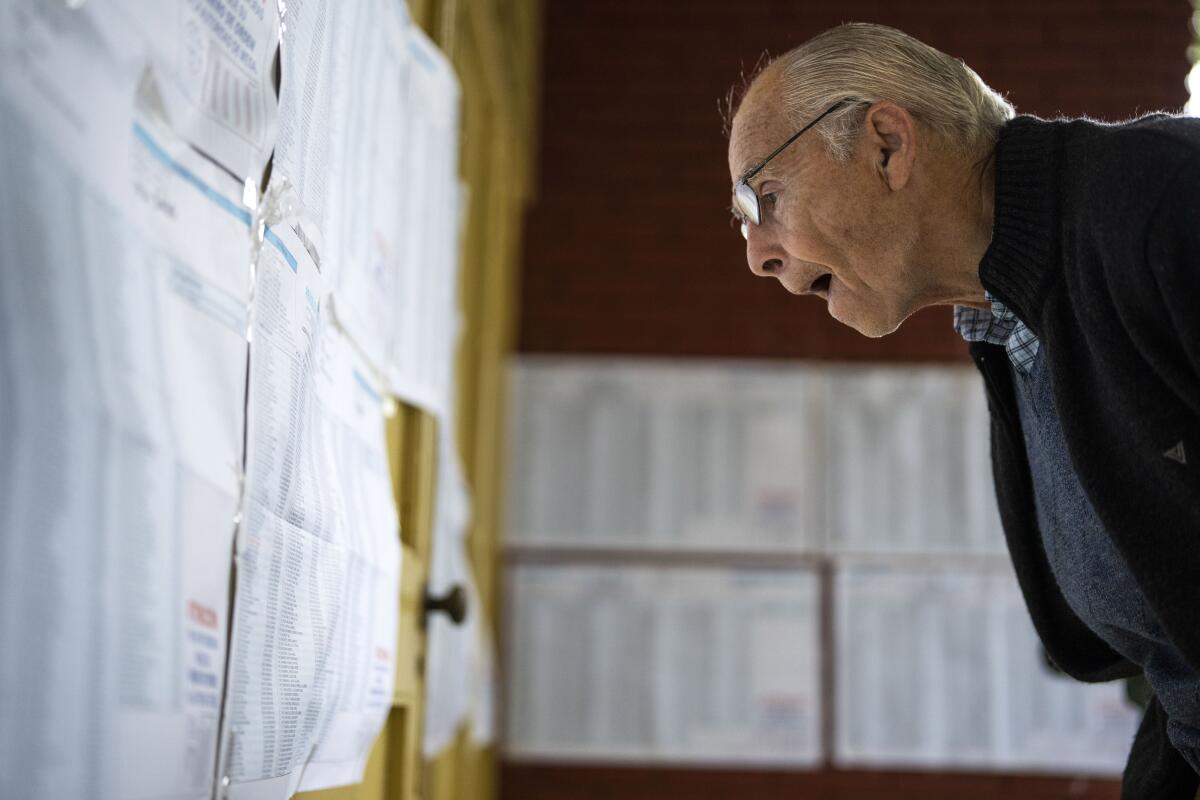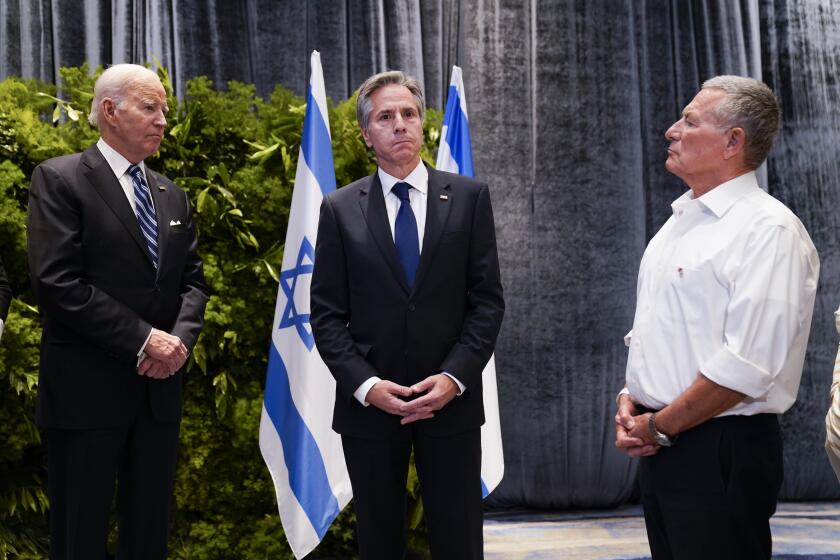Argentina Economy Minister Sergio Massa leads populist Javier Milei in presidential vote count

- Share via
BUENOS AIRES — Economy Minister Sergio Massa took the lead Sunday in Argentina’s presidential election against right-wing populist Javier Milei who has pledged to drastically overhaul the state. But a runoff next month appeared probable.
With 86% of the votes counted, Massa had 36.2%, and Milei 30.3%.
To win outright and avoid a Nov. 19 runoff, a candidate needed to get 45% of the vote, or 40% with a 10-point lead over the runner-up.
The highly polarized election will determine whether South America’s second-largest economy will continue with a center-left administration or elect one of the right-leaning leaders who both promised profound changes to a country plagued by triple-digit inflation and rising poverty. Former Security Minister Patricia Bullrich, the other right-wing candidate, was trailing well behind Massa and Milei in the early results.
Milei, who has been a lawmaker in Argentina’s lower house of Congress since 2021rocked Argentina’s political landscape when he unexpectedly received the most votes in August primaries.
The warning comes as Israel’s military response to the attack by Hamas on civilians in communities in southern Israel entered its third week.
Both Massa and Bullrich, of the main opposition coalition, focused much of their firepower in the campaign’s final days on warning voters against electing Milei, who they called a dangerous upstart. For his part, Milei characterized his two main opponents as members of a privileged “political caste” that has brought Argentina to its beleaguered economic state and must be purged so he could enact an audacious economic agenda.
Around 35 million Argentines were eligible to vote, and about one-quarter of the electorate abstained.
Milei, a self-described anarcho-capitalist who admires former U.S. President Trump, has said he would slash public spending, halve the number of government ministries, eliminate the central bank and replace the local currency with the U.S. dollar.
He first made a name for himself with angry tirades blasting what he calls the “political caste” on television, and has gained support from Argentines struggling to make ends meet amid annual inflation of 140% and a rapidly depreciating currency. His platform also calls for reshaping Argentine culture, and he casts himself as a crusader against the sinister forces of socialism at home and abroad.
Massa appeared to have outperformed predictions by growing support significantly in the critical Buenos Aires province, home to more than one-third of the electorate, said one pollster, who insisted on not being quoted by name in commenting on unofficial results.
Preelection polls, which have been notoriously unreliable, gave Milei a slight lead that would be insufficient to avoid a runoff in November.
Massa, a leading figure in the center-left administration in power since 2019, sought to rally support despite the fact inflation has soared on his watch. He blamed recent troubles on a historic drought that decimated exports and said he prevented things from getting worse.
“The worst is over,” Massa often said at his rallies.
On the streets of Argentina, those with any disposable income are snapping up goods in anticipation of a possible currency devaluation. The day after the primaries, the government devalued the peso by nearly 20%.
Argentines were also buying dollars and removing hard currency deposits from banks as the peso accelerated its already steady depreciation.
Milei characterized his two main opponents as part of the entrenched and corrupt establishment that brought South America’s second-largest economy to its knees. That message resonated among many Argentines who watched their economic prospects wither under successive administrations in which both Massa and Bullrich served.
Like Trump, Milei has already cast doubt on the electoral system. He said fraud cost him as many as five points in the primaries, although he never filed a complaint in court. Political analysts warned that Milei could be setting the stage to question the results.
The election comes at a time when several Latin American countries have seen elections marked by anti-incumbent sentiment and political outsiders amid general discontent over the economy and crime. Daniel Noboa, an inexperienced politician who is the heir to a banana fortune, won the presidency in Ecuador earlier this month.
More to Read
Sign up for Essential California
The most important California stories and recommendations in your inbox every morning.
You may occasionally receive promotional content from the Los Angeles Times.














